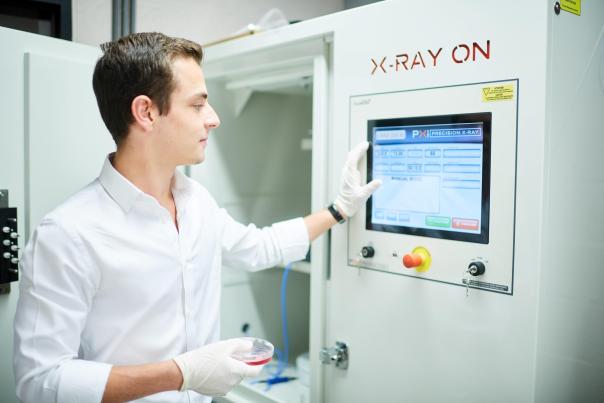The Physics Department's research today focuses on the study of inert or living materials, various forms of radiation, and their interactions. The Physics Department is divided into 4 promising and original research themes.
Research is led by 15 academics, who pool their skills and enthusiasm around a multitude of projects. They are surrounded by large teams of international researchers, logisticians, engineers and technicians. In all, there are no fewer than 100 people working together to ensure the success and renown of the Physics Department's research, which has been internationally recognized for over 50 years.
Beyond the classic academic spin-offs, it's worth noting that research in the department has led to the emergence of a spin-off dedicated to surface treatment and the development of high-performance coatings (ICS - Innovative Coatings Solutions).
Promising themes
The Department of Physics is divided into 4 promising and original research themes.

Research units
Involvement of researchers in institutes
Researchers in the department are active in the following research institutes:
Associated technology platforms
The physics department makes its equipment and skills available to research centers, companies and industries in the region for the microscopic analysis of samples and for the physical interpretation of the phenomena that gave rise to the structure or composition of the samples appraised (metal sheets, glass, ceramics, liquids, biological materials, etc.).
The equipment is grouped together within the following technology platforms:
A significant proportion of the research projects developed in the department have a direct bearing on the environment, energy production and storage, and the well-being, safety or health of populations. These include, but are not limited to:
- Design of materials for shielding electronic circuits from electromagnetic interference
- Development of innovative, environmentally-friendly polymer materials
- Study of atmospheric and stratospheric pollution using molecular spectroscopy
- Optimization of photovoltaic, photothermal and LED cell efficiency
Involvement of researchers in institutes
Department members participate in regional and national boards, international commissions and evaluation committees.
- High-level group for 3% in research (European Lisbon agreement) (2004-2005)
- Radio-protection
- Marshall Plan evaluation committees
- European project selection and evaluation committees
- National committee for physics and crystallography
In the field of teaching, the Department organizes several pedagogical days for secondary school teachers each year.
It regularly welcomes secondary school classes to its practical work rooms. High school students are also welcome to observe internships in research laboratories.

